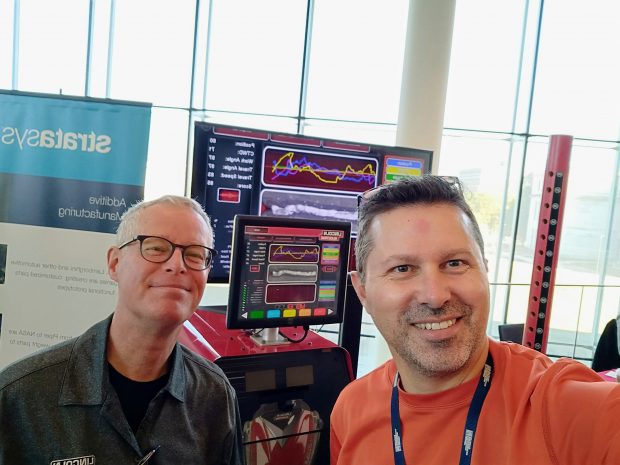[et_pb_section fb_built=”1″ _builder_version=”3.22″][et_pb_row _builder_version=”3.25″ background_size=”initial” background_position=”top_left” background_repeat=”repeat”][et_pb_column type=”4_4″ _builder_version=”3.25″ custom_padding=”|||” custom_padding__hover=”|||”][et_pb_text _builder_version=”3.27.4″ background_size=”initial” background_position=”top_left” background_repeat=”repeat”] A member of our DSC Makerspace team, Rich McCue, had the opportunity to participate in the 2nd annual International Symposium on Academic Makerspaces (ISAM 2017), at Case Western Reserve University in Cleveland at the end of September. Rich wrote a research paper based on post-workshop survey data titled, “Flipping the Makerspace to Maximize Active Learning Time in Introductory Workshops.” Rich also presented on the same topic at the conference and enjoyed the good discussion followed the talk.
A member of our DSC Makerspace team, Rich McCue, had the opportunity to participate in the 2nd annual International Symposium on Academic Makerspaces (ISAM 2017), at Case Western Reserve University in Cleveland at the end of September. Rich wrote a research paper based on post-workshop survey data titled, “Flipping the Makerspace to Maximize Active Learning Time in Introductory Workshops.” Rich also presented on the same topic at the conference and enjoyed the good discussion followed the talk.
Here is the introduction from the conference paper:
A flipped, active learning teaching method not only makes efficient use of limited makerspace time and space but also allows participants to work through instructional materials at their own pace before a flipped makerspace workshop. This is done by devoting face-to-face workshop time to hands-on activities, moving most of the instruction into online modules to be completed before the session starts. This contrasts with a common makerspace pedagogy of peer-to-peer instruction or assistance, which “takes advantage of the student-run aspect by creating a comfortable environment taught by peers”. While in many instances the individual peer-to-peer instruction is the preferred way to meet the needs of makerspace users, in the case of students without previous makerspace experience, workshops that don’t require a routine commitment can be a great introduction without the perception of any commitment beyond the workshop.
A flipped, active learning teaching method where face-to-face time is devoted to hands-on activities in makerspace workshops, and most instruction is completed online before the session, not only makes efficient use of limited makerspace time and space but also allows participants to work through the pre-workshops materials at their own pace.
In order to better understand student perceptions of the flipped makerspace workshop format, we conducted follow up surveys after every introductory workshop in order to answer the following research questions:
- RQ1: What are student satisfaction levels for introductory makerspace workshops taught using a flipped, active learning teaching method?
- RQ2: Do students value being able to work at their own pace in flipped active learning workshops?
- RQ3: Would students prefer peer tutoring over a flipped workshop to be introduced to a new technology?
- RQ4: Are there any differences based on the faculty students belong to?
For those interested here is a link to the complete conference paper: https://dspace.library.uvic.ca/handle/1828/8619
Reference was made to our Creative Commons licensed Workshop Curriculum in the Q&A session following the presentation. Here is a link to the curriculum: https://oac.uvic.ca/dsc/workshops/creative-commons-licensed-workshop-curriculum/
[/et_pb_text][et_pb_post_nav prev_text=”%title” next_text=”%title” _builder_version=”4.4.7″ global_module=”4392″][/et_pb_post_nav][/et_pb_column][/et_pb_row][/et_pb_section]
